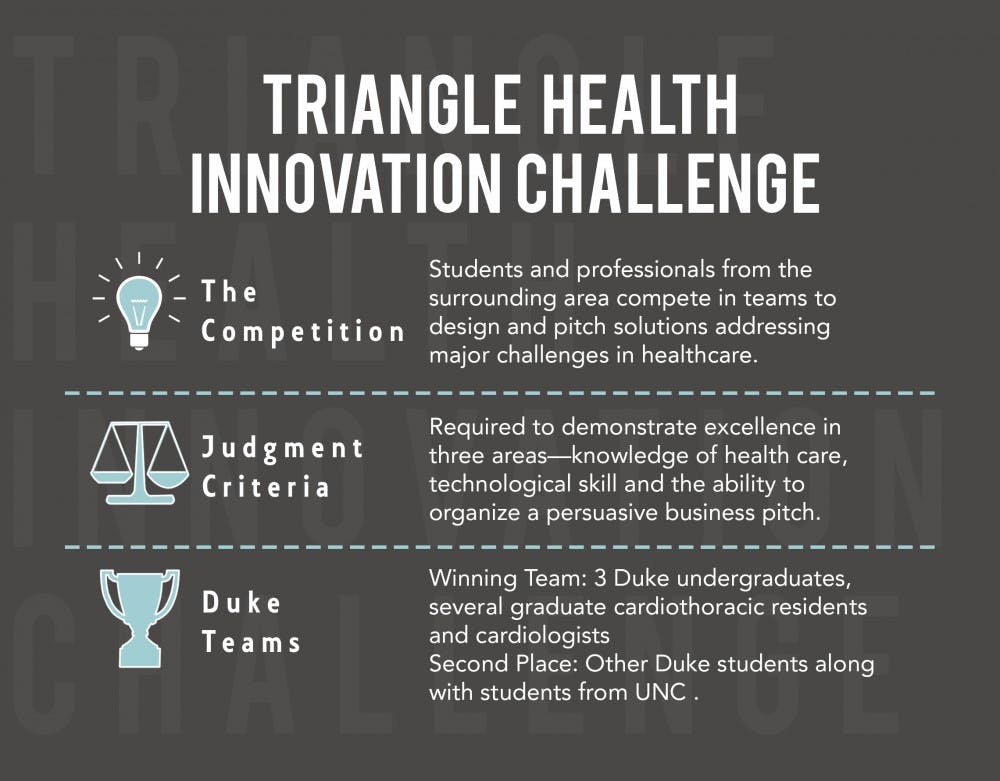Several Duke students participated in teams that placed first and second at the Triangle Health Innovation Challenge this year.
In the Triangle Health Innovation Challenge—now in its second year—students and professionals from the surrounding area compete in teams to design and pitch solutions addressing major challenges in healthcare. Teams participating in THInC are given no more than 48 hours to formulate a technological solution to a relevant issue.
Junior Harry Ahn was a member of the winning team, along with two other undergraduates and several graduate students, cardiothoracic residents and cardiologists from Duke. The healthcare problem that Ahn's team focused on involved heart failure patients and high readmission rates. Patients being readmitted to hospitals is a major factor in high healthcare costs, Ahn explained.
"Our solution was building a tool that will provide patients with continuous education and also serve as a tool that will allow them to monitor weight or their medication," Ahn said.
The eclectic team of clinical professionals, graduate students and undergraduates from different departments formed a team in the competition due to their "mutual interest" in the problem, Ahn noted.
"It was a really great experience. Compared to other hackathons, [THInC] is not really computer science-heavy," Ahn said. "Even if you don't know how to do professional coding, you should try it out, especially if you're interested in healthcare."
Other Duke students along with students from UNC comprised a team that won second place in the competition for their proposal to use virtual reality to treat post traumatic stress disorder. The second place team, made up of six Duke undergraduates and one undergraduate from UNC, also received the Janssen Mental Health Prize for their prototype of a portable virtual reality device that uses exposure therapy to treat PTSD in veterans.
“People are already using virtual reality to treat PTSD patients, and that has been pretty effective in the cases it had been used," said sophomore Robyn Guo, a member of the second-place team. "We wanted to help make that more accessible."
Guo explained that solutions are judged based on how practical they are and by the
viability of the team’s business plan. Teams participating in THInC, she added, are thus
required to demonstrate excellence in three areas—knowledge of health care,
technological skill and the ability to organize a persuasive
business pitch.
During the competition, the team developed a smartphone application that could connect to a portable virtual reality headset and thus allow PTSD patients to recreate the experience of encountering a potential trigger. By repeatedly exposing themselves to such triggers, Guo said, patients might theoretically be able to reduce their anxiety.
Guo noted that their app seeks to provide access to different categories of triggers, so psychiatrists can better tailor their therapy to the needs of individual patients. Some examples of such triggers, she added, included fireworks, lightning and thunder.
Although Guo noted that the patient's psychiatrist would likely need to be present to monitor the first session, future sessions would ideally be self-administered or with the help of a family member, eliminating the need to travel to a distant clinic and associated logistical problems such as parking fees.
Sophomore Gary Wang, another member of the team, added that many veterans live in rural areas and do not have easy access to health care facilities capable of providing this form of therapy. He said that the application designed by his team could help make treatment more conveniently accessible by using the virtual reality headsets, which would be less expensive and more portable than most other options.
Though the team did formulate a crude prototype during the course of their project, Guo and Wang said that they do not currently plan to convert their idea into a commercial product, as they lack both the necessary funding and resources.
“As students it’s really difficult to be able to create a full prototype," Wang said. "Something like this requires millions of dollars of funding to be able to create pilot programs, to create necessary technology and to really get through the whole process.”
Both Guo and Wang noted that they would be open to having an external organization with more resources take their idea and turn it into a marketable product.
Get The Chronicle straight to your inbox
Sign up for our weekly newsletter. Cancel at any time.
“It would be nice to get credit for our idea, but if others could actually make it a reality and help a lot of people, I’m definitely for it,” Guo said.
Abigail Xie contributed reporting.

